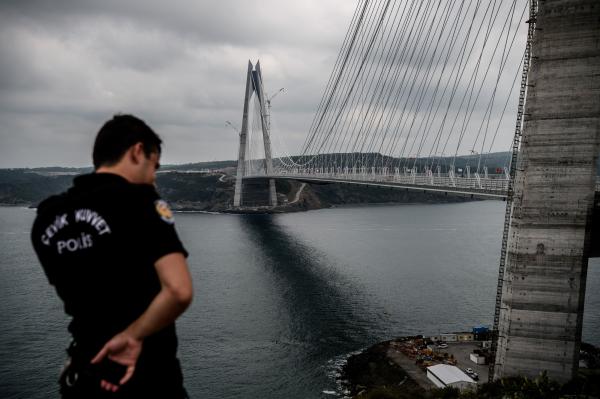Turkey opens one of the world’s biggest suspension bridges on Friday, creating a new link between two continents with the latest megaproject in a $200 billion building spree that President Tayyip Erdogan hopes will secure his place in history.
The bridge across the Bosphorus Strait, which divides Asia and Europe, is built in the style of New York’s Brooklyn Bridge and boasts pylons higher than the Eiffel Tower. It is 1.4 km long and 59 metres wide, with eight vehicle lanes and two high-speed rail lines, wrote Reuters.
Erdogan is seeking to use such projects to drive economic growth and secure a place as Turkey’s most significant leader since the modern republic’s founder Mustafa Kemal Ataturk.
“Be proud of your power, Turkey,” said a TV advert before the opening of the $3 billion Yavuz Sultan Selim Bridge on the edge of Istanbul. It is named after a 16th-century Ottoman ruler.
Erdogan’s infrastructure drive is transforming Europe’s biggest city, which straddles the Bosphorus Strait. In a little more than a decade, Istanbul’s skyline has soared, new highways have been built, and the length of the metro tripled.
But Turkey’s stellar economic growth has slowed since 2011 and it could face difficulties attracting investment following an attempted coup last month, which led to a purge by the government that has seen tens of thousands of people in the military, judiciary, civil service and education being detained, suspended or placed under investigation.
The country has also been hit by attacks this summer by Islamic State on a wedding party and Istanbul airport, while the Turkish army’s incursion this week in Syria to curb jihadist and Kurdish forces has unsettled nerves.
But Erdogan – whose government announced a $200 billion, decade-long infrastructure investment plan three years ago – has vowed the months of turmoil will not hold back planned megaprojects. He is due to attend Friday’s bridge opening.
The Yavuz Sultan Selim, which runs from the Garipce area on Istanbul’s European side to the region of Poyrazkoy on the Asian side, is the third bridge to span the Bosphorus Strait and can withstand winds of 300 km an hour. It ranks among the world’s biggest suspension bridges, in terms of width of deck, height of pylons as well as length of span.
It has been built by Italy’s Astaldi and Istanbul-based IC Ictas which will jointly operate it for about a decade.
Officials say the bridge will ease congestion in a city of 14 million people, reduce fuel costs and save workers time.
Environmentalists say the project threatens Istanbul’s last forestland and will contaminate water supplies. Some economists warn the costs of such large-scale building is unsustainable.
